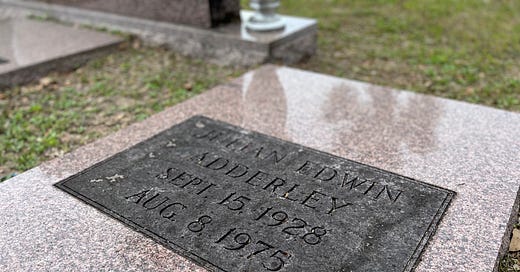Yesterday morning, I made a pilgrimage to Southside Cemetery in Tallahassee, Florida, to spend a little time at the gravesite of Nat and Cannonball Adderley. This morning, I learned of the death of Harry Belafonte, at 96. The title of this post gives away the reason that these two events feel so eerily in sync. But I have more to say.
As I mentioned last time, I was in Tallahassee for Word of [South], a festival of literature and music. My role in the fest was to moderate a panel discussion on the topic of Women in Jazz. The panelists were singer Carmen Bradford, multi-instrumentalist Gunhild Carling, drummer Sylvia Cuenca, guitarist and singer Téka Penteriche, bassist Amina Scott, baritone saxophonist Lauren Sevian, and pianist Helen Sung. Each of these fine musicians also performed in various combinations, along with trumpeter, educator and curator Scotty Barnhart. The discussion was lively and enlightening, and the musical performances were first-rate across the board.
Elsewhere over the course of the weekend, the programming at Word of [South] kept returning to a theme of social justice. It surfaced in separate performances by two members of the Americana group Our Native Daughters: Amythyst Kiah, drawing mainly from her 2021 release Wary + Strange, and Allison Russell, performing songs from her 2022 debut Outside Child. Each played banjo as well as electric guitar, singing songs that meld the confessional with the confrontational. Each was backed by a killer band. And each gave voice to a struggle that branched outward, inviting the audience to identify. “I fear a world in which we think that banning books will make our children safe,” Russell said at one point; there was no need to mention that we were half a mile away from the state capitol where Ron DeSantis is pushing that very idea.
Word of [South] is held at Cascades Park, in downtown Tallahassee. Much of the festival unfolds at a Marriott hotel, which happens to sit on a historically significant site. I had no idea until I stumbled across a marker, but the hotel was constructed on the former site of the Leon County Jail, where student activists were imprisoned after one of the earliest lunch counter sit-ins, in the spring of 1960. The plight of the activists, who languished there from March 18 to May 5, led Dr. Martin Luther King, Jr. to send a letter of encouragement. “As you suffer the inconvenience of remaining in jail, please remember that unearned suffering is redemptive,” Dr. King wrote. “Going to jail for a righteous cause is a badge of honor and a symbol of dignity.”
Earlier in the day, I’d seen an inspired pairing of historian Jon Meacham and guitarist Yasmin Williams, who delivered a joint message of hope over despair. Meacham, a charming and effective storyteller, traced the liberation narrative in American history, from the founding of the nation up through the present day. At crucial junctures, Williams played deft fingerstyle versions of resonant songs: “The Battle Hymn of the Republic,” “We Shall Overcome,” Elizabeth Cotton’s “Freight Train.” (That last one was a dealer’s choice). The emotional crux of the presentation was Meacham’s heartfelt tribute to former Representative and civil rights leader John Lewis, who embodied Dr. King’s exhortation about bodily sacrifice for a righteous cause. Meacham made a point of mentioning that Lewis was arrested more than 45 times.
Keep reading with a 7-day free trial
Subscribe to The Gig to keep reading this post and get 7 days of free access to the full post archives.





